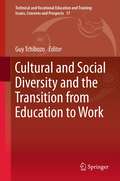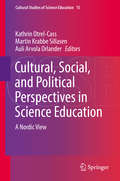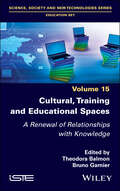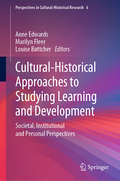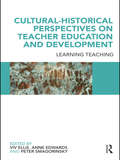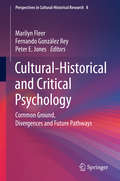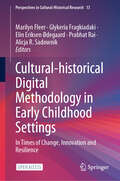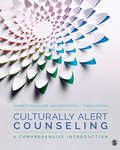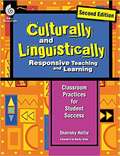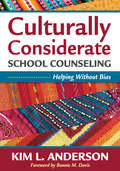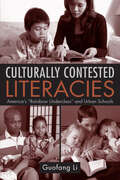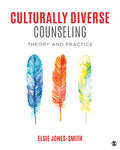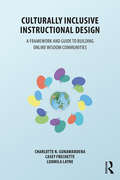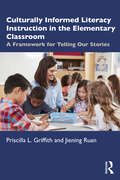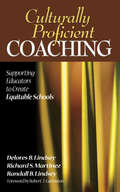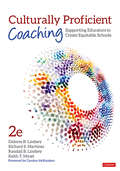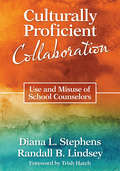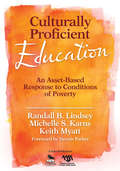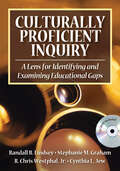- Table View
- List View
Cultural and Social Diversity and the Transition from Education to Work (Technical and Vocational Education and Training: Issues, Concerns and Prospects #17)
by Guy TchibozoThis edited volume provides multidisciplinary and international insights into the policy, managerial and educational aspects of diverse students' transitions from education to employment. As employers require increasing global competence on the part of those leaving education, this research asks whether increasing multiculturalism in developed societies, often seen as a challenge to their cohesion, is in fact a potential advantage in an evolving employment sector. This is a vital and under-researched field, and this new publication in Springer's Technical and Vocational Education and Training series provides analysis both of theory and empirical data, submitted by researchers from nine nations including the USA, Oman, Malaysia, and countries in the European Union. The papers trace the origins of business demand for diversity in their workforce's skill set, including national, local and institutional contexts. They also consider how social, demographic, cultural, religious and linguistic diversity inform the attitudes of those seeking work--and those seeking workers. With clear suggestions for future research, this work on a topic of rising profile will be read with interest by educators, policy makers, employers and careers advisors.
Cultural, Social, and Political Perspectives in Science Education: A Nordic View (Cultural Studies of Science Education #15)
by Kathrin Otrel-Cass Martin Krabbe Sillasen Auli Arvola OrlanderThis book presents a collection of critical thinking that concern cultural, social and political issues for science education in the Nordic countries. The chapter authors describe specific scenarios to challenge persisting views, interrogate frameworks and trouble contemporary approaches to researching teaching and learning in science. Taking a point of departure in empirical examples from the Nordic countries the collection of work is taking a critical sideways glance at the Nordic education principles. Critical examinations target specifically those who are researching in the fields of science education research to question whether conventional research approaches, foci and theoretical approaches are sufficient in a world of science education that is neither politically neutral, nor free of cultural values. Attention is not only on the individual learner but on the cultural, social and political conditions and contexts in science education. The different chapters review debates and research in teacher education, school teaching and learning including when external stakeholders are involved. Even though the chapters are contextualized in Nordic settings there will be similarities and parallels that will be informative to the international science education research community.
Cultural, Training and Educational Spaces: A Renewal of Relationships with Knowledge
by Theodora BalmonFor two centuries, the school system has been a central point around which other players have gravitated: local authorities, voluntary organizations and the world of work. Over the course of the 20th century, this school centric configuration underwent a transformation, with local authorities tending to become integrated into the vertical culture of the school system. This was only the beginning of a process that brought schools and socio cultural players into constant contact. Cultural, Training and Educational Spaces first examines the relationships with knowledge generated by the links between the school system and other cultural, training and educational spaces, taking a historical, pedagogical and philosophical perspective. Easy access to learning materials creates different relationships with knowledge than those observed in schools. The book then looks at the pedagogical practices in these different cultural educational spaces, such as libraries and media libraries, museums and historical sites, places of heritage, history and entertainment, social networks and other multimedia formats.
Cultural-Historical Approaches to Studying Learning and Development: Societal, Institutional and Personal Perspectives (Perspectives in Cultural-Historical Research #6)
by Anne Edwards Marilyn Fleer Louise BøttcherThis collection of papers examines key ideas in cultural-historical approaches to children’s learning and development and the cultural and institutional conditions in which they occur. The collection is given coherence by a focus on the intellectual contributions made by Professor Mariane Hedegaard to understandings of children’s learning through the prism of the interplay of society, institution and person. She has significantly shaped the field through her scholarly consideration of foundational concepts and her creative attention to the fields of activity she studies. The book brings together examples of how these concepts have been employed and developed in a study of learning and development. The collection allows the contributing scholars to reveal their reactions to Hedegaard’s contributions in discussions of their own work in the field of children’s learning and the conditions in which it occurs.
Cultural-Historical Perspectives on Teacher Education and Development: Learning Teaching
by Viv EllisTeachers, both in and beyond teacher education programmes, are continual learners. As society itself evolves, new settings and the challenges they provide require new learning. Teachers must continually adapt to new developments that affect their work, including alterations to qualification systems, new relationships with welfare professionals, and new technologies which are reconfiguring relationships with pupils. Cultural-Historical Perspectives on Teacher Education and Development is an international volume which clarifies the purpose of initial (pre-service) teacher education and continuing professional development, and the role of universities and higher education personnel in these processes. An edited collection of chapters by leading researchers from the UK, the US and Europe, it gains coherence from its theoretical orientation and substantive focus on teacher learning. This book: demonstrates the contribution of sociocultural and cultural-historical activity theory (CHAT) towards our understandings of teacher learning offers a strong exemplification of a research focus on teachers as learners in specific sociocultural settings shows what teachers learn, how they learn and where they learn, using specific research examples, in the context of broader interests in the development of professional practice and professional education. As the only volume now available that applies CHAT principles to teacher education and learning, Cultural-Historical Perspectives on Teacher Education and Development will be highly useful for teachers and teacher educators undertaking postgraduate and doctoral studies, particularly in the area of professional learning and development. It will also be of relevance to the continuing development of teachers and other school-based professionals.
Cultural-Historical and Critical Psychology: Common Ground, Divergences and Future Pathways (Perspectives in Cultural-Historical Research #8)
by Marilyn Fleer Peter E. Jones Fernando González ReyThis book opens up a critical dialogue within and across the theoretical traditions of critical psychology and cultural-historical psychology. It explores and addresses fundamental issues and problems within both traditions, with a view to identifying new avenues for productive discussion and cooperation between these two important movements in contemporary psychology. Accordingly, the book gathers contributions from a range of internationally respected researchers from both fields who have demonstrated a willingness to look critically, and self-critically, at their theoretical allegiances and trajectories. This book provides readers with the opportunity to both appreciate and reflect on fundamental differences of perspective across the ‘cultural-historical’/’critical’ psychology divide and, thereby, to consider and debate key issues facing the discipline of psychology more generally.
Cultural-historical Digital Methodology in Early Childhood Settings: In Times of Change, Innovation and Resilience (Perspectives in Cultural-Historical Research #13)
by Marilyn Fleer Elin Eriksen Ødegaard Alicja R. Sadownik Glykeria Fragkiadaki Prabhat RaiThis open access book addresses methodological issues related to researching young children’s learning and development, teacher education, and professional development. It pays special attention to research conducted in digital contexts in response to the new societal demands of a global pandemic and crisis. It illustrates and discusses new methods and tools, new study designs, new analysis techniques, and new procedures developed in a time of crisis in two different parts of the world, Australia and Norway. The book suggests that, during the global pandemic, a theoretical crisis in researching children’s development in different contexts has emerged, which has not only created the need for new methods and methodologies, but has opened the space for the development of theory itself. Following a cultural-historical perspective, this book theorises these new approaches to create new theoretical concepts and new ways of researching, better understanding, and efficiently supporting childhoods in a continually changing world. This book is a great resource for researchers and students in the fields of early childhood education and educational psychology.
Culturally Alert Counseling: A Comprehensive Introduction
by Garrett J. McAuliffeCulturally Alert Counseling: A Comprehensive Introduction is a reader-friendly introduction to the cultural dimensions of counseling and psychotherapy. Editor Garrett McAuliffe, along with international experts in their fields, provides an accessible presentation of culturally alert counseling techniques that broadens the discussion of culture from ethnicity and race to include social class, religion, gender, and sexual orientation. Culture is defined broadly in the text, which features a mindful exploration of seven ethnic groupings, inclusive of all people within dominant and non-dominant cultural groups. The extensively revised Third Edition includes two new chapters on counseling immigrants and refugees and counseling military populations, exposing students to complex cultural developments. With the help of this text, readers will leave informed and ready to begin practice equipped with both a vision of the work and practical skills for effectively implementing it.
Culturally Alert Counseling: A Comprehensive Introduction
by Garrett J. McAuliffeCulturally Alert Counseling: A Comprehensive Introduction is a reader-friendly introduction to the cultural dimensions of counseling and psychotherapy. Editor Garrett McAuliffe, along with international experts in their fields, provides an accessible presentation of culturally alert counseling techniques that broadens the discussion of culture from ethnicity and race to include social class, religion, gender, and sexual orientation. Culture is defined broadly in the text, which features a mindful exploration of seven ethnic groupings, inclusive of all people within dominant and non-dominant cultural groups. The extensively revised Third Edition includes two new chapters on counseling immigrants and refugees and counseling military populations, exposing students to complex cultural developments. With the help of this text, readers will leave informed and ready to begin practice equipped with both a vision of the work and practical skills for effectively implementing it.
Culturally And Linguistically: Classroom Practices For Student Success (Culturally And Linguistically Responsive Teaching And Learning)
by Sharroky HollieCulturally and Linguistically Responsive Teaching and Learning is a strategy audio guide designed to help teachers learn key strategies to approach their teaching through a culturally and linguistically responsive lens; embracing and placing value on students' culture and language, allowing them to thrive in the classroom. Narrated by Dr. Sharroky Hollie, this educational resource helps teachers stay up-to-date with current research, best practices, and evidence-based teaching strategies. It provides novice and experienced educators with a pedagogical framework for implementing culturally and linguistically responsive strategies in today's diverse classrooms; addresses culture and language in five key areas: classroom management, academic literacy, academic vocabulary, academic language, and learning environment. PDF resources of the appendices from the print version are included. An ideal resource for teachers either through the school year or during the summer, but also useful for homeschooling parents looking to meet the demands of today’s educational curriculum.
Culturally Conscious Decision-Making for School Leaders: A Toolkit for Creating a More Equitable School Culture
by Shauna McGeeThis exciting new book provides school leaders with a highly effective framework for culturally responsive and equity-driven leadership. School culture is how you lead, how your core values are represented in the work you do daily, and how stakeholders are impacted by what you choose. Author and educator Shauna McGee helps you grapple with the technical and adaptive challenges of developing an effective culture, and you’ll learn how to shape your school culture by applying a culturally responsive lens to your decision-making. Each chapter in this practical book explores a different area of decision-making – including vision, budgeting, instructional programming, capacity building, and use of data. Full of rich examples, takeaway rubrics, and questions for self-reflection, this book is designed for current and aspiring school leaders who want to develop an equitable and student-centered culture.
Culturally Considerate School Counseling: Helping Without Bias
by Kim L. AndersonThis compassionately written guidebook cultivates "cultural competence," integrates ASCA National Model standards, and provides strategies for exploring each student's individuality and responding accordingly.
Culturally Contested Literacies: America's "Rainbow Underclass" and Urban Schools
by Guofang LiCulturally Contested Literacies is a vivid ethnographic account of the everyday cross-cultural living and schooling experiences of six culturally-diverse families in urban America. Documenting the ways in which these families learn about literacies and their meanings in relation to schools, inner city environments, and other ethnic groups, Guofang Li's incisive analysis reveals the unique experiences of fractured urban America. Unlike prior research that fragments various social categories, Culturally Contested Literacies explores the rich complexity within each family as they make sense of their daily relations in terms of race, ethnicity, class, and gender. It then juxtaposes the productions of such familial relations across and within cultural groups with the context of the larger socio-political and socio-economic formations. By presenting a realistic picture of the varying ways that America’s "rainbow underclass" might encounter schooling, Li argues that urban education must be understood in relation to not only the individual’s cultural and familial milieu, but also to the interactive context between the individual and schools.
Culturally Diverse Counseling: Theory and Practice
by Elsie Jones-SmithCulturally Diverse Counseling: Theory and Practice adopts a unique strengths-based approach in teaching students to focus on the positive attributes of individual clients and incorporate those strengths, along with other essential cultural considerations, into their diagnosis and treatment. With an emphasis on strengths as recommended in the 2017 multicultural guidelines set forth by the American Psychological Association (APA), this comprehensive text includes considerations for clinical practice with twelve groups, including older adults, immigrants and refugees, clients with disabilities, and multiracial clients. Each chapter includes practical guidelines for counselors, including opportunities for students to identify and curb their own implicit and explicit biases. A final chapter on social class, social justice, intersectionality, and privilege reminds readers of the various factors they must consider when working with clients of all backgrounds.
Culturally Diverse Counseling: Theory and Practice
by Elsie Jones-SmithCulturally Diverse Counseling: Theory and Practice adopts a unique strengths-based approach in teaching students to focus on the positive attributes of individual clients and incorporate those strengths, along with other essential cultural considerations, into their diagnosis and treatment. With an emphasis on strengths as recommended in the 2017 multicultural guidelines set forth by the American Psychological Association (APA), this comprehensive text includes considerations for clinical practice with twelve groups, including older adults, immigrants and refugees, clients with disabilities, and multiracial clients. Each chapter includes practical guidelines for counselors, including opportunities for students to identify and curb their own implicit and explicit biases. A final chapter on social class, social justice, intersectionality, and privilege reminds readers of the various factors they must consider when working with clients of all backgrounds.
Culturally Inclusive Instructional Design: A Framework and Guide to Building Online Wisdom Communities
by Casey Frechette Charlotte Gunawardena Ludmila LayneWINNER OF THE 2019 OUTSTANDING BOOK AWARD FROM AECT'S DIVISION OF DISTANCE EDUCATION! As online courses and digital learning enable more people from more places to learn together, it is crucial for instructional design to incorporate diverse cultural perspectives. Culturally Inclusive Instructional Design provides a framework for thinking about culture in digital learning, offering insight into how to build inclusive online communities that encourage reflection and growth, regardless of content domain. Chapters cover the foundation, components, and implementation of the authors’ Wisdom Communities (WisCom) framework, which enables learners from global backgrounds to experience long-lasting, transformative learning through real-world problem-solving. This book is a timely, resourceful guide to building truly collaborative, inquiry-based online learning experiences.
Culturally Informed Literacy Instruction in the Elementary Classroom: A Framework for Telling Our Stories
by Jiening Ruan Priscilla L. GriffithThis text introduces an original, scalable instructional framework called Telling Our Stories (TOS), an approach for supporting culturally informed literacy instruction in the elementary classroom. Connecting the theory to practice, the TOS framework centers the cultural heritage and experiences of students and offers a roadmap to scientifically and pedagogically sound instruction. Aligned with current curriculum standards, chapters feature authentic examples and case studies, reflection questions, and writing activities that will foster a culture of inclusion, community, and academic rigor. The many practical strategies promote students’ learning and appreciation of diversity through academic reading and writing as well as positive school-family and school-community relations. Readers will come away with new ideas, tools, and a thorough understanding of how to integrate culturally informed practices in ways that support the learning of all children. Accessible and comprehensive, this is an essential text for pre-service teachers in courses on ELA methods and literacy instruction, as well as practicing teachers.
Culturally Proficient Coaching: Supporting Educators to Create Equitable Schools
by Delores B. Lindsey Randall B. Lindsey Richard S. MartinezGet the solution to the equity equation: cultural insight plus coaching! To arm educators with the tools necessary to close the achievement gap, this straightforward guide blends the Five Essential Elements of Cultural Proficiency with the Five States of Mind of Cognitive CoachingSM. It offers a practical strategy for being mindfully attuned to—and leveraging—cultural diversity to optimize student learning. Boosting educators’ cultural confidence and consciousness while honing their coaching skills, this interactive resource features: Action-planning worksheets Reflective questions Coaching maps and conversation vignettes Real-life examples through a composite case story
Culturally Proficient Coaching: Supporting Educators to Create Equitable Schools
by Delores B. Lindsey Randall B. Lindsey Keith T. Myatt Richard S. MartinezWhy a new edition of Culturally Proficient Coaching? Why now, especially? Because several polarizing years later, there&’s even greater urgency for us all to critically examine our attitudes, beliefs, and practices when working with students who look or sound &“different.&” No matter how broadly you define coach, no matter which coaching model you follow, this is the resource to help you get started. With the first edition, the authors&’ big goal was to shift our thinking in service of standards-based teaching and leading, and equitable interactions that support all students achieving at highest levels. Now, with this second edition, the authors add a third goal: to encourage a more holistic mindset and expanded contextual uses. New features include: Enhanced research on the effectiveness of coaching in educational settings New data on response to implicit bias and microaggressions--subtle and unintentional, yet destructive, forms of discrimination that continue to marginalize Refinement and updating of the Tools of Cultural Proficiency, which enable you to provide equitable life-affirming experiences to all cultural groups Expanded models of Culturally Proficient Coaching Conversations A special section on crafting Breakthrough Questions to shift entrenched mindsets and barriers to Cultural Proficiency By design, Culturally Proficient Coaching is an intentional, inside-out approach that mediates a person&’s thinking toward values, beliefs, and behaviors that enable effective cross-cultural interactions and equitable learning environments. Here&’s your opportunity to serve as that expert and trusted mediator, boosting educators' cultural confidence and consciousness, while honing their coaching skills. "We owe it to ourselves and to our children to productively embrace and engage diversity, with all of its tensions, for the sustainability of humanity. These authors have given us the invitation, the road map, and the call to action. the embarkment is up to each one of us." --Carolyn M. McKanders, Director Emeritus Center for Adaptive Schools and Thinking Collaborative
Culturally Proficient Coaching: Supporting Educators to Create Equitable Schools
by Delores B. Lindsey Randall B. Lindsey Keith T. Myatt Richard S. MartinezWhy a new edition of Culturally Proficient Coaching? Why now, especially? Because several polarizing years later, there&’s even greater urgency for us all to critically examine our attitudes, beliefs, and practices when working with students who look or sound &“different.&” No matter how broadly you define coach, no matter which coaching model you follow, this is the resource to help you get started. With the first edition, the authors&’ big goal was to shift our thinking in service of standards-based teaching and leading, and equitable interactions that support all students achieving at highest levels. Now, with this second edition, the authors add a third goal: to encourage a more holistic mindset and expanded contextual uses. New features include: Enhanced research on the effectiveness of coaching in educational settings New data on response to implicit bias and microaggressions--subtle and unintentional, yet destructive, forms of discrimination that continue to marginalize Refinement and updating of the Tools of Cultural Proficiency, which enable you to provide equitable life-affirming experiences to all cultural groups Expanded models of Culturally Proficient Coaching Conversations A special section on crafting Breakthrough Questions to shift entrenched mindsets and barriers to Cultural Proficiency By design, Culturally Proficient Coaching is an intentional, inside-out approach that mediates a person&’s thinking toward values, beliefs, and behaviors that enable effective cross-cultural interactions and equitable learning environments. Here&’s your opportunity to serve as that expert and trusted mediator, boosting educators' cultural confidence and consciousness, while honing their coaching skills. "We owe it to ourselves and to our children to productively embrace and engage diversity, with all of its tensions, for the sustainability of humanity. These authors have given us the invitation, the road map, and the call to action. the embarkment is up to each one of us." --Carolyn M. McKanders, Director Emeritus Center for Adaptive Schools and Thinking Collaborative
Culturally Proficient Collaboration: Use and Misuse of School Counselors
by Randall B. Lindsey Diana L. StephensOptimize school counselors and raise your school’s cultural competence The authors make a compelling case for recognizing professional school counselors as leaders of 21st-century change rather than "gatekeepers" of the status quo. Today’s school leaders need to acknowledge counselors’ value in the necessary work of providing equitable resources and opportunities for children in today’s multicultural environment. Aligned with the American School Counselor Association National Model for school counseling programs, this book provides a conceptual framework and practical protocols for utilizing school counselors as: Change agents for school improvement Creators of results-based programs Equity advocates for all students This book shows how to make the most of school leadership teams by empowering counselors to contribute to each school’s success.
Culturally Proficient Education: An Asset-Based Response to Conditions of Poverty
by Randall B. Lindsey Michelle S. Karns Keith T. MyattDevelop culturally proficient policies and practices that create opportunities for students of poverty! Countering the perspective that students from poverty come to school with deficits that prevent them from learning, this resource offers educators the knowledge and skills to maximize educational opportunities for all students, independent of students’ socioeconomic status. Using the framework of cultural proficiency, this guide features: An examination of how poverty intersects with other groupings, including race, ethnicity, and language acquisition Research-based teaching strategies that draw on student strengths and assets Vignettes and case studies Reflective activities for understanding your own assumptions and values regarding equity
Culturally Proficient Inclusive Schools: All Means ALL!
by Delores B. Lindsey Jacqueline S. Thousand Cynthia L. Jew Lori R. PiowlskiCreate inclusive educational environments that benefit ALL learners! As schools become more diverse with students of differing abilities and needs, this self-reflective and action-oriented guide helps you create and support more inclusive schools and classrooms that intentionally educate all students. Using the Five Essential Elements of Cultural Proficiency as a roadmap, this book presents: Students’ learning differences as just that – differences rather than deficits Strategies that show you how to break though the common barriers to culturally proficient and inclusive schooling Assessments that gauge your awareness and show you how to best serve every student’s needs
Culturally Proficient Inclusive Schools: All Means ALL!
by Delores B. Lindsey Jacqueline S. Thousand Cynthia L. Jew Lori R. PiowlskiCreate inclusive educational environments that benefit ALL learners! As schools become more diverse with students of differing abilities and needs, this self-reflective and action-oriented guide helps you create and support more inclusive schools and classrooms that intentionally educate all students. Using the Five Essential Elements of Cultural Proficiency as a roadmap, this book presents: Students’ learning differences as just that – differences rather than deficits Strategies that show you how to break though the common barriers to culturally proficient and inclusive schooling Assessments that gauge your awareness and show you how to best serve every student’s needs
Culturally Proficient Inquiry: A Lens for Identifying and Examining Educational Gaps
by Lindsey, Randall B., Graham, Stephanie M., Westphal, R. Chris Jr., and Jew, Cynthia L."What is best about this remarkable book is its constant reminder that the courage to do what is just and right for the ′underserved′ comes to those who face the ′brutal facts,′ listen to the difficult questions, and seek support and guidance from educators in the field. This book is an inspiring companion needed now more than ever."—Sidney Morrison, PrincipalHoward Wood Elementary School, Torrance, CA"Provides the information and tools needed to create powerful learning communities in which the academic and co-curricular needs and the well-being of all students are addressed through purposeful inquiry and culturally proficient practices. This text is a must-read for educational leader preparation programs and for all educational leaders who want to make a difference."—Linda Purrington, Director, Educational Leadership AcademyPepperdine UniversityUse inquiry to promote equity and transform your school′s educational environment!Imagine improving student and teacher performance and enriching the culture in your school while implementing deeper goals for educational equity and long-term success. Using the lens of cultural proficiency, the authors lead practitioners through the process of gathering and analyzing data to meet the needs of historically underserved students. This book provides educators with a critical evaluation process and rubrics to examine why some students are not being educated to their full potential. The chapters carefully guide readers through the steps of analyzing and using data to:Encourage discussions about promoting educational equity for all studentsCreate a realistic picture of the cultural and economic diversity of your schoolInitiate authentic systemic changeEffectively respond to NCLB legislative mandatesWith a CD-ROM of tables and spreadsheets for data entry, Culturally Proficient Inquiry provides a model for framing professional conversations and making data-based decisions to ensure that all children receive the education they deserve.
